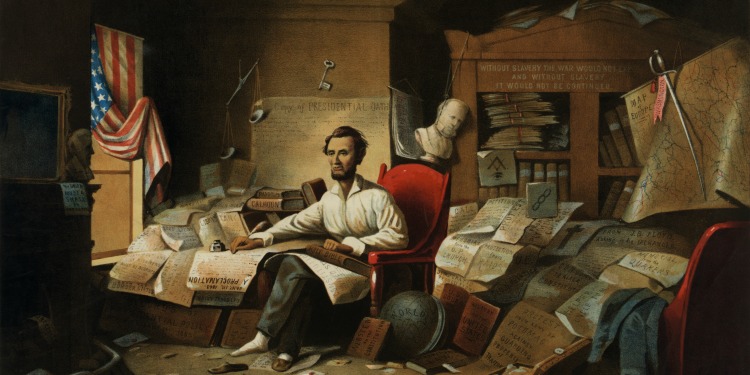Queen Esther and President Lincoln
The Fellowship | March 21, 2019

The Word of God has shaped much of history, including that of the United States. Writing at Tablet, Ari Lamm takes a look at how the biblical story of Queen Esther inspired Abraham Lincoln to make one of the most momentous decisions in American history:
About a week and a half before issuing a preliminary draft of the Emancipation Proclamation on Sept. 22, 1862, President Abraham Lincoln spent a quiet Saturday morning meeting with prominent abolitionist Rev. William Weston Patton. A few months earlier, at a June cabinet meeting, Lincoln had declared his intention to issue an edict of emancipation. But his worry over the Union’s military prospects, and the accompanying concern over seeming to act from a position of desperation, had so far prevented Lincoln from publishing any such edict. In the hopes of encouraging him in the right direction, Patton met with Lincoln to make the religious case for emancipation. Patton concluded his remarks to the President by comparing him to Queen Esther. Drawing upon Chapter 4 in the Book of Esther, in which her cousin Mordechai exhorts Esther to seize the moment and exercise moral leadership, Patton beseeched Lincoln to recognize the wondrous opportunity presented to him by the Almighty to right an historic wrong: “[we] believe that in Divine Providence you have been called to the Presidency to speak the word of justice and authority which shall free the bondman and save the nation.” As Patton saw it, as soon as Esther was made aware of an injustice, she took action and damn the consequences. He felt Lincoln should do the same, assuring the president: “If the Leader will but utter a trumpet call, the nation will respond with patriotic ardor.”
Patton’s interpretation of Esther as zealous idealist is, like the Elizabethans before him, difficult to square with the Book of Esther itself. According to the biblical narrative, when Mordechai informs Esther of Haman’s murderous intentions, she does not immediately confront the king and demand that he rectify the situation. Instead, she devises a political strategy that takes into consideration Haman’s power and influence in the royal court. Counting on Haman’s growing sense of complacency, Esther waited for a moment of maximal opportunity to make her case before Xerxes. Far from throwing caution to the wind and depending upon a miracle, Esther was a deeply strategic thinker who knew that the arc of history does not bend toward justice of its own accord. It must be bent with human participation.
In the end, it was Lincoln himself who best captured the nuances of the biblical Esther. In his response to Patton’s invocation of the biblical queen, Lincoln replied: “Whatever shall appear to be God’s will I will do.” This is a striking, likely deliberate echo of Esther’s words upon hearing from Mordechai of Haman’s plot: “I will go to the king, though it is against the law; and if I perish, I perish.” Like Esther, Lincoln knew the dire risks his proposed course of action entailed for his people, and nevertheless resolved to do the right thing. But, also like Esther, Lincoln refused to take impulsive action. The president had already determined that he would issue the Emancipation Proclamation months before he met with Patton. He felt, however, that it would take a decisive battlefield triumph by Northern forces to vest his edict with the necessary legitimacy in practice. He therefore kept a draft of the edict in his drawer for the entire summer of 1862, biding his time, waiting for the moment when doing the right thing would not only feel good, but be effective. In this respect, Lincoln embodied the legacy of Queen Esther. And if David Gilmour Blythe’s 1863 painting of Lincoln writing the Emancipation Proclamation—in which Lincoln looks for inspiration to two documents: the Constitution and the Bible—is any guide, perhaps Lincoln knew it, too…
